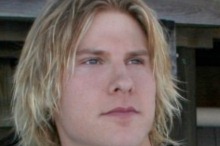Putting a Face on Blood Donations
 Brian Boyle is being honored as a Champion of Change for his service to the American Red Cross.
Brian Boyle is being honored as a Champion of Change for his service to the American Red Cross.
My name is Brian Boyle, I am 26 years old, and I am a blood recipient. I am honored to be recognized as a White House Champion of Change on behalf of the American Red Cross.
Eight years ago, on July 6, 2004, I was involved in a near fatal car accident that caused catastrophic injuries. My heart was pushed across my chest, crushed pelvis, shattered ribs, broken clavicle, collapsed lungs, every major organ was damaged, and I lost 60% of my blood. My blood donors were the foundation of my recovery. When I arrived at Shock Trauma by medevac, I received 36 blood transfusions and 13 plasma treatments, underwent 14 life saving operations, and would spend the next two months in a medically induced coma on life support. I eventually awoke from the coma and after intensive rehabilitation, I learned how to blink, move my fingers, talk, eat, sit upright, stand, walk, and then swim, bike, and run.
Three years after leaving the Intensive Care Unit, I completed the healing process when I crossed the finish line in the Ironman World Championship in Hawaii – the greatest day of my life.
I made a promise to myself when I was in rehab that I would give back to the Red Cross to help other patients the first opportunity I had. For the past five years I have travelled across the nation speaking at Red Cross events, hosting blood drives and acting as a national spokesperson to illustrate the crucial need for blood. I also participate in marathons and triathlons on behalf of the Red Cross. This year, I completed the Boston Marathon and New York City Ironman. In October, I'll compete in the Hartford Marathon, each time wearing the Red Cross emblem on the front and back of my suit. Lastly, I use social media to promote the Red Cross to my more than 3,500 followers. I find it is a great way to keep the discussion about the need for blood alive and it encourages others to support the Red Cross by donating blood, volunteering their time or making a financial contribution.
Every two seconds someone in America will need blood, and blood donations to the Red Cross this past summer were the lowest they’ve been in 15 years. By sharing my story with hundreds of media outlets, including national media such as CNN and Fox News Channel, I am able to put a face to blood donation.
My personal story of how blood donation helped save my life has reached hundreds of thousands of people through my interviews. I am also a Red Cross blood donor and have given the gift of life five times. Every time you give just one unit of blood you could help up to three patients in need. I usually double my impact by giving a double red cell donation to help more patients.
The Red Cross is always there in the deepest and darkest moments of unimaginable human suffering. I am only one of many who have been impacted by blood donations. I plan to continue competing in endurance races on behalf of the Red Cross for as long as I can. When I run every step is an achievement, and every breath is a gift. During a race when I feel my heart racing and my blood pumping, these were once signs that I was dying, now these are signs that I am living, and thanks to the Red Cross, living is something I don’t take for granted. This spring, I am hosting my annual Iron Heart 5k race in my home state of Maryland and I am working with the Red Cross to make the race bigger and better! My participation in races is much more than earning a finisher’s medal and for personal achievement, but it is another way I can express my gratitude to the Red Cross and blood donors everywhere.
The need is constant. The gratification is instant. Give blood.
Brian Boyle is a national spokesperson for the American Red Cross, after surviving a horrific car crash and receiving 36 blood transfusions
White House Blogs
- The White House Blog
- Middle Class Task Force
- Council of Economic Advisers
- Council on Environmental Quality
- Council on Women and Girls
- Office of Intergovernmental Affairs
- Office of Management and Budget
- Office of Public Engagement
- Office of Science & Tech Policy
- Office of Urban Affairs
- Open Government
- Faith and Neighborhood Partnerships
- Social Innovation and Civic Participation
- US Trade Representative
- Office National Drug Control Policy
categories
- AIDS Policy
- Alaska
- Blueprint for an America Built to Last
- Budget
- Civil Rights
- Defense
- Disabilities
- Economy
- Education
- Energy and Environment
- Equal Pay
- Ethics
- Faith Based
- Fiscal Responsibility
- Foreign Policy
- Grab Bag
- Health Care
- Homeland Security
- Immigration
- Innovation Fellows
- Inside the White House
- Middle Class Security
- Open Government
- Poverty
- Rural
- Seniors and Social Security
- Service
- Social Innovation
- State of the Union
- Taxes
- Technology
- Urban Policy
- Veterans
- Violence Prevention
- White House Internships
- Women
- Working Families
- Additional Issues

